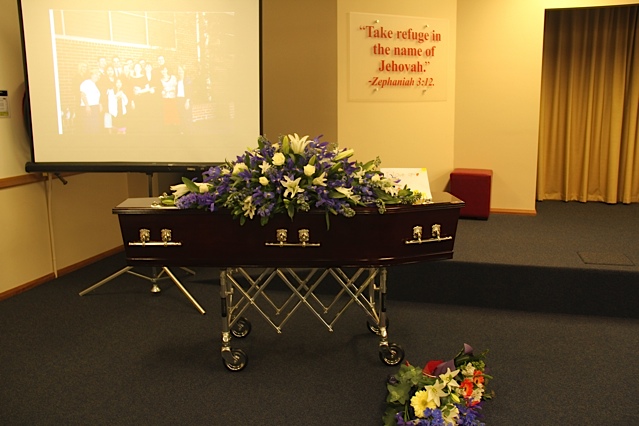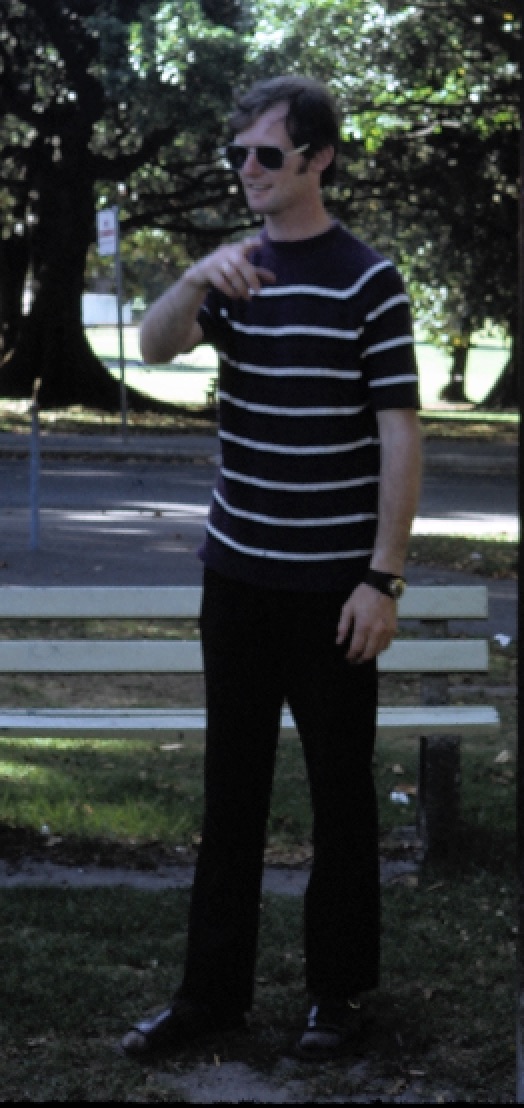home > interesting topics > random musings > fathers funeral
Attending My Father’s Funeral
By Paul Grundy
Prior to attending the funeral of my Father, I had not stepped into a Kingdom Hall for over six years. That occasion was also to attend a funeral, out of respect for a kind and loving Jehovah's Witness lady that had been like a mother to me.
As the sister's funeral progressed, I became more and more irritated at the proceedings. The speaker began his talk with the briefest of details regarding the deceased, and then transitioned to a standard public talk - Why do people die? Where are the dead? What is the resurrection hope? What is the difference between the great crowd and anointed? How great Jehovah and his arrangements are and how lucky Jehovah’s Witnesses are to have such knowledge and hope. He then stated that if we are to enjoy of this wonderful hope we need to make sure we are having a full share in the preaching work. His talk was nothing more than a Watchtower marketing pitch. Almost as an afterthought, the speaker referred back to the deceased sister, but only to conclude that she had believed these things as well. I left sad and disappointed.
In sharp contrast, I have attended non-Witness funerals where several people shared their memories. Many wonderful stories paint a picture of the person beyond what I had known. I love the poem the poem “Funeral Blues” by W. H. Auden recited at the funeral speech in Four Weddings and a Funeral. That is how a funeral should be: close friends and relatives being permitted to reminisce about a lost loved one, without pressure to force religious beliefs upon attendees in mourning.
When my father was dying from cancer, I feared the prospect of attending his funeral and felt enraged that Watchtower's Funeral Discourse outline at the time specifically stated:
“Instead of eulogizing the deceased, use the material in this outline to give a fine witness concerning the truth. Good balance should be observed in this regard. Doctrinal points can be presented as beliefs of the deceased, which served as motivation for him.” (Refer to the Footnotes for information and links to Watchtower's various Funeral Outlines.)
Even more difficult would be the shunning I would receive. I would be going back to the congregation I was raised in, but this time I would be considered "a notorious apostate." I had read many experiences about the mistreatment of former Witnesses at funerals and how they were shunned or excluded from the proceedings.
My Father's Funeral

My Father's funeral turned out to be a departure from normal. Dad had been a Circuit Overseer until his diagnosis, and even whilst he was undergoing treatment he spent a week in Bethel to conduct an audit. His prominence in the organisation apparently made a difference, as the funeral talk was unlike any I'd heard before. My father's coffin was displayed in the Kingdom Hall, and two brothers from Bethel flew down to give a two-part funeral discourse.
The first brother covered information from the standard funeral outline. But rather than just a typical Watchtower marketing pitch, Dad's life and achievements were actually woven throughout his presentation of Watchtower doctrine. It was a satisfying summary of a wonderful man.
It still all led back to the Watchtower though. Dad had gone to university prior to his conversion and been an accountant and auditor. The speaker seemed determined to show that because of Dad being intelligent and analytical (or did he mean despite these attributes?), he came to believe the Watchtower was God's organisation. This sort of self-affirmation is common amongst Witnesses, but it's a rhetorical fallacy, since all religions contain some intelligent people.
There followed a second brief talk by the Australian Bethel Branch coordinator, Terrence O'Brien, passing on the love and condolences of the Bethel family.
The treatment I received at the Kingdom Hall varied. When I entered the hall a brother gave me a large hug, and several others came up to speak to me. Several of my old Witness friends spoke to me quite normally. However, after that I noticed that the majority refused to approach me, and specifically avoided any eye contact. One person spoke to my cousin who was standing next to me, but completely ignored me. No matter how often it occurs, being shunned is always difficult. How do these people think that shunning is supposed to show that they are the most loving and truthful organisation, when to any outside observer it is a sure sign of being a cult?
More difficult to deal with was those that didn't shun me, but made a point of pushing the Watchtower line on me. One sister said, "Under the circumstances, I am here to give my condolences, under the circumstances." Another told me that now that Dad was gone it was time to "get my act together". I was asked if I had "come back to the truth" yet? Another Witness reminded me that I had "suffered the greatest loss of anyone at the hall, because I will never see my father again unless I make some changes".
It is a shame that even during such a difficult time, the Organisation feels determined to impose its irrational behaviour on others. I have been out of the religion long enough, and been confronted by shunning often enough, to have been prepared to handle the craziness. But I was certainly glad to arrive back home and count my blessings that now I am free from such control.
Footnotes
The 2016 Funeral outline has removed the direction against "eulogising the deceased ...". It now says:
REMARKS REGARDING THE DECEASED
[Use any that apply and are appropriate.]
Give details regarding age, birth, when married, surviving family, and so forth
Share the dedication record of the deceased, including privileges of service
Highlight exemplary qualities displayed by the deceased (Ec 7:1)
...
While not overpraising the deceased, you may use events from his life throughout the talk to show how those in attendance can benefit from his example.
In 2021, I attended my mother in law's funeral. Whilst refreshing that the initial 6 minutes were devoted to discussing the deceased, during that short time the word Jehovah was used 11 times. The other 19 minutes were devoted to discussion of Watchtower teachings, along with a Watchtower song and prayer. Whilst an improvement on previous talk outlines, it was still predominantly devoted to Watchtower teachings.
On the offical Watchtower website, the section Frequently Asked Questions answers, "How Do Jehovah’s Witnesses View Funerals?" It claims:
"We do not try to impose on others our beliefs regarding funerals. In this regard, we follow the principle: “Each of us will render an account for himself to God.” (Romans 14:12) However, if we are given the opportunity, we do try to explain our beliefs “with a mild temper and deep respect.”—1 Peter 3:15.
...
Service: A talk is given to comfort the bereaved by explaining what the Bible says about death and the hope of a resurrection. (John 11:25; Romans 5:12; 2 Peter 3:13) The funeral program may call to mind the good qualities of the person who died, perhaps highlighting encouraging lessons from that person’s faithful example." "How Do Jehovah’s Witnesses View Funerals?" (As of 17 October 2018.)
Anyone that has attended the funeral of a deceased Jehovah's Witness at a Kingdom Hall will know that the majority of the sermon is an imposition of Watchtower's belief system, with little time devoted to discussing the deceased. The 2020 Funeral Discourse outline is filled with Scriptures and makes it clear the purpose of the funeral talk is to draw attention to Jehovah and "the truth."
"The purpose of the talk is to uphold Jehovah as a God of love and mercy and at the same time bring comfort to the bereaved. Give a fine witness concerning the truth, but also make your talk warm and personal." S-32-E 10/20
As far back as the 1950's, it has been suggested that funerals should be used to promote doctrine.
"... the holding of a funeral service affords a marvelous opportunity to give a witness to God’s kingdom and the blessings that it will bring to mankind, including the resurrection of the dead." Watchtower 1959 Jul 15 p.448
For copies of the Watchtower Funeral Discourse go to:
- 1990 Watchtower Funeral Discourse PDF
- 2008 Watchtower Funeral Discourse PDF
- 2016 Watchtower Funeral Discourse PDF
- 2020 Watchtower Funeral Discourse PDF
Old School Cool - Terrence Grundy 1973

Written 2011, latest update Sep 2023.
![]() Paul Grundy 2005 - 2026
Paul Grundy 2005 - 2026
